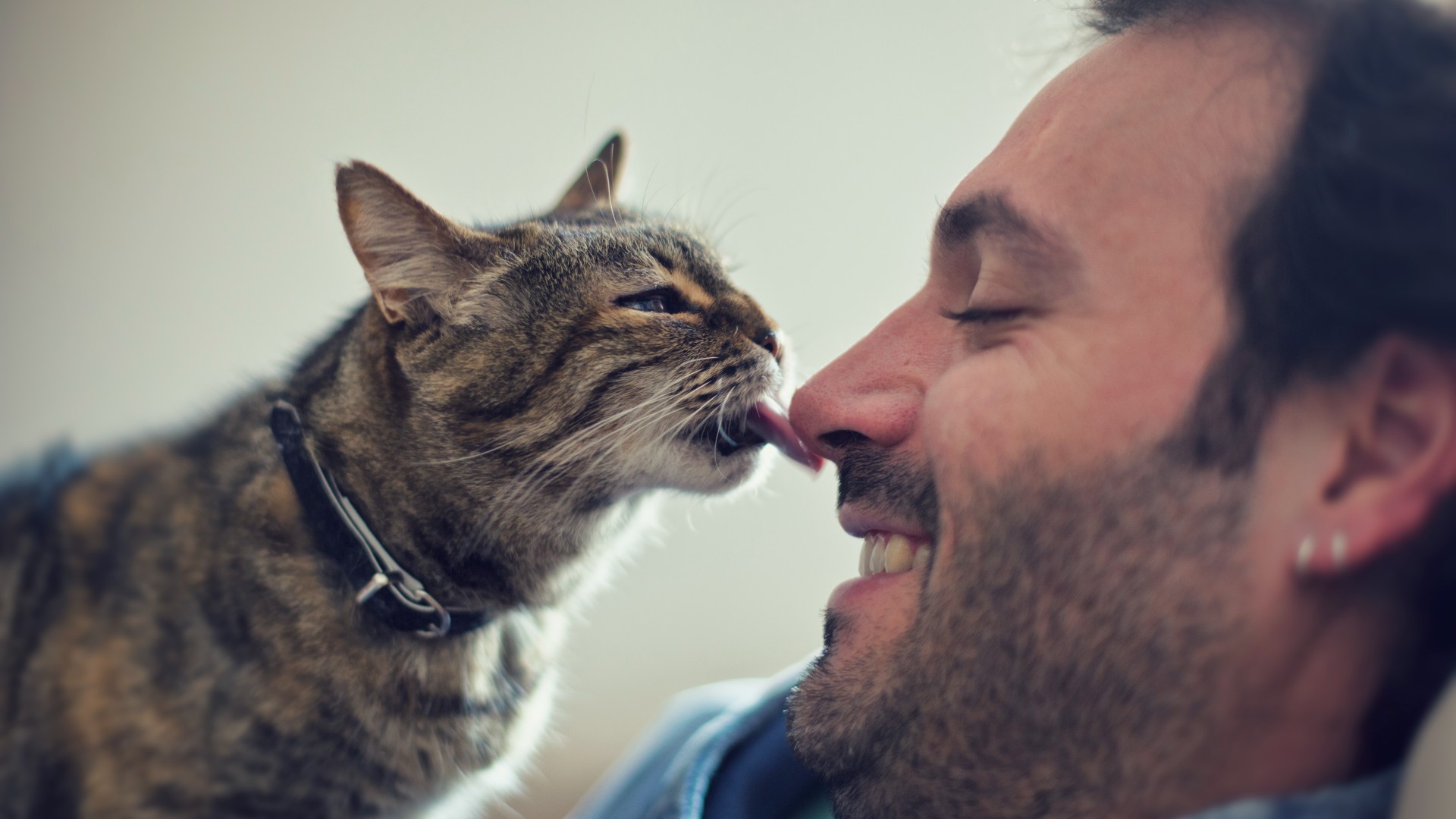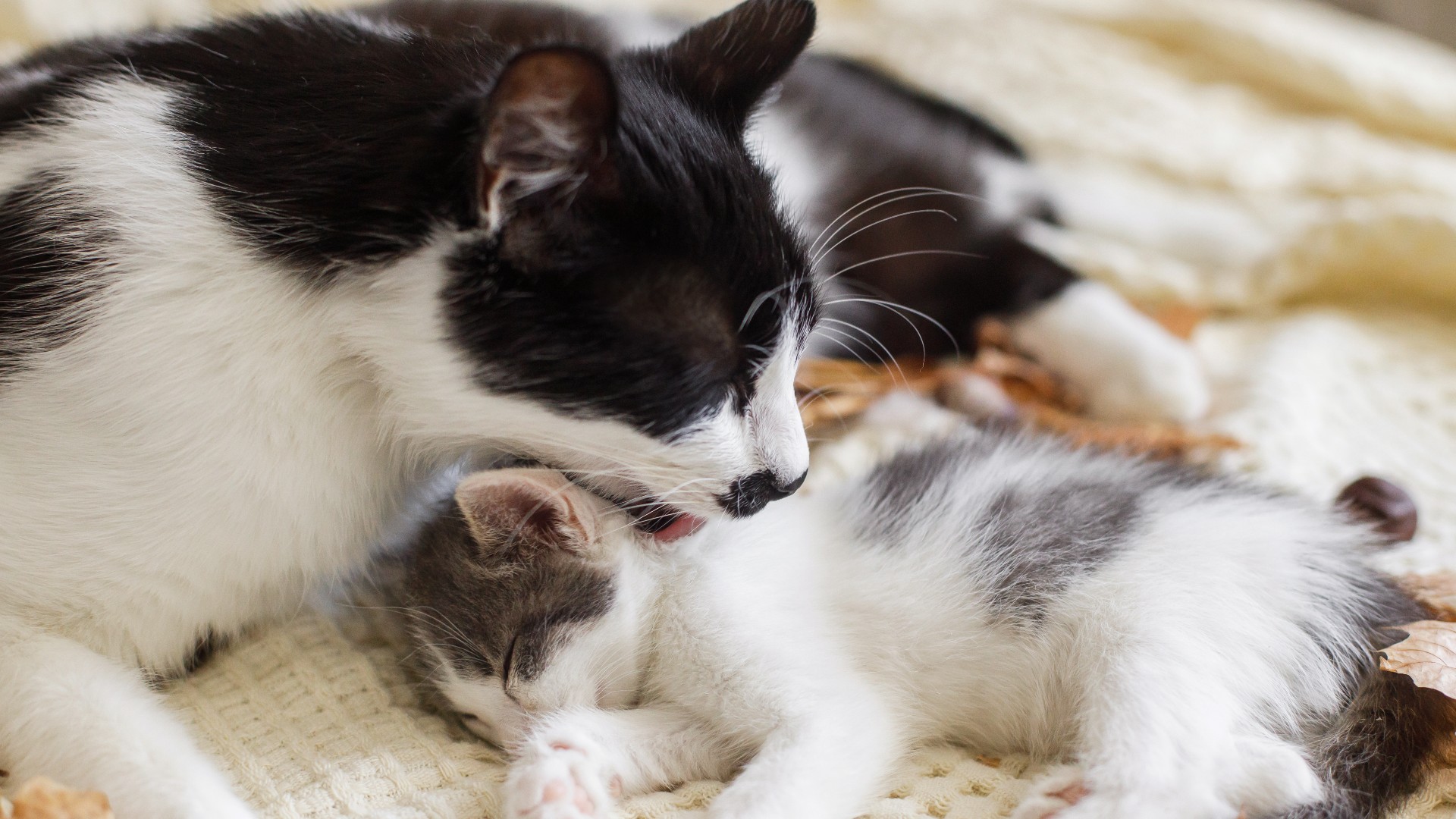
Why do cats lick?
Is the cat displaying affection, or does it just want a taste?

Cats are notorious for their allegedly aloof nature, but even a habitually frosty feline may occasionally swipe a human arm, leg or face with its textured tongue. So why might a cat lick you? Is it displaying affection, or does it just want a taste?
Anyone who has ever observed a cat's daily activities probably knows that cats lick themselves all the time. Domestic cats (Felis catus), which sleep an average of 14 hours each day, spend up to a quarter of their waking hours grooming their fur, according to a 2018 study published in the journal Proceedings of the National Academy of Sciences.
"Cats lick themselves to help keep their coats clean and healthy," Kristyn Vitale, an assistant professor of animal health and behavior at Unity College in Maine, told Live Science. "It is important that cats groom themselves because it helps to maintain the health of their fur."
Cats groom their fur with the aid of hundreds of sharp, hollow, backward-facing spines carpeting their tongues. These spines, called papillae, are made of keratin, the same substance that hair and claws are made of, according to the 2018 study. Because of the spines' hooklike shape, they behave like Velcro: As a cat's tongue glides over fur, the keratin spines catch on tangles of hair, according to research presented at the 2016 annual meeting of the American Physical Society's Division of Fluid Dynamics in Portland, Oregon, Live Science previously reported.
Related: Why do cats 'play' with their prey?
Regular maintenance of the coat is important for cats, as it removes any debris or matter that has become stuck to their fur and helps prevent the fur from matting — that is, becoming knotted and tangled, Vitale explained. Matted hair can not only cause discomfort for cats but also lead the skin underneath to become irritated and inflamed, posing a risk of infection, according to 4 Paws Veterinary Care in Wynantskill, New York.
Cats may also groom themselves "as a stress-relieving behavior," Vitale said. "Sometimes this can turn into over-grooming, in which the cat licks itself so much that patches of fur go missing. This may be a sign of a behavioral or medical issue."
Sign up for the Live Science daily newsletter now
Get the world’s most fascinating discoveries delivered straight to your inbox.

Cats also often lick other cats. For instance, mother cats regularly lick their kittens.
"Licking of kittens actually plays a vital role in kitten survival," Vitale said. "Very young kittens are unable to urinate or defecate on their own. The mother will lick the genital region of her kittens in order to stimulate them to go to the bathroom."
Additionally, "the mother licks her kittens to soothe them and keep them clean," Vitale said. Anyone who has raised orphaned kittens knows it is a full-time job trying to keep a newborn kitten's fur clean."
Finally, cats may also lick acquaintances — a behavior known as allogrooming, Vitale said.
"Cats may engage in allogrooming with other cats as well as other social partners, such as dogs and humans," Vitale said. "Friendly behaviors like allogrooming are thought to strengthen the relationship between the individuals involved."
Cats may engage in further friendly licking "before or after a bout of play," Vitale added. "Often with my cats, they will begin by grooming one another, and then the interaction will slowly shift to play wrestling and chasing, before the two settle down and fall asleep next to one another."
Unlike scent marking, allogrooming is not a way for cats to designate what they consider their property.
"Territorial behaviors are those that promote active defense of a location," Vitale said. "Instead, allogrooming is an affiliative behavior, or a bond-building behavior. Allogrooming occurs when a cat is relaxed and in the presence of a preferred social partner. The cat may also initiate social contact through licking because they are seeking attention from the person."
Originally published on Live Science.











